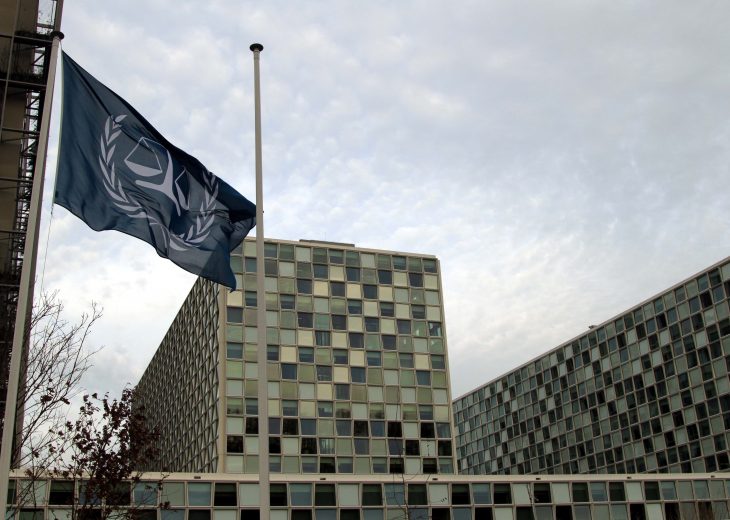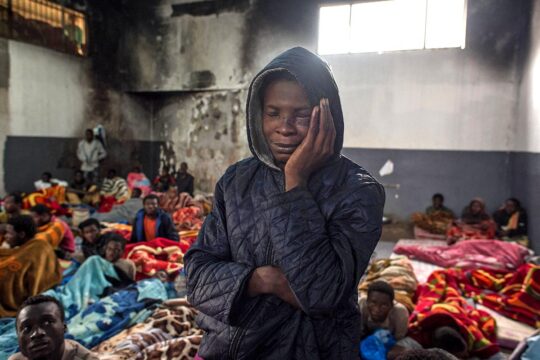Six glass towers of different heights, meant to mirror the sand dunes of the North Sea coast, have since December 14 been the new home of the International Criminal Court (ICC). Now that it has taken possession of these purpose-built premises, the Court sees it as an opportunity to project its own permanent status. The ICC now sits in the international district of The Hague, near the International Criminal Tribunal for the former Yugoslavia, the NCIA (a NATO agency), the Peace Palace and above all only 2 km from the prison in Scheveningen where ICC detainees are kept as they await trial. At one time the Court envisaged building an underground tunnel from the prison basement to its new buildings, but this was abandoned as too costly. When the construction project was approved by ICC States Parties in December 2007, the Netherlands agreed to make the Alexander barracks (Alexanderkazerne) site available free of charge. Some NGOs protested at the idea that the Court be housed on a former military site. But there is now no trace of the former royal army stables or the officers’ mess, everything has been swept clean for the occasion.
Danish architects Schmidt Hammer Lassen got the contract for the design of the building in 2010, on an idea symbolizing “transparency”. But this has not made the Court more accessible. On the contrary the idea, meant to highlight the public nature of justice, is no more than a symbol. Strangely, the design of the three new courtrooms makes ICC proceedings even more opaque. The accused and parties in the trial are placed at some distance from the public gallery. As for the witnesses, most of whom have their identities protected, they are completely hidden from the public. In the name of transparency, what the Court has really done is seal the distance that already separates it from those in whose name it aims to deliver justice.
The new Court premises are not raising much enthusiasm. Many people are disappointed by the impersonal feeling of the place. One European minister expressed concern last spring about the effect these hyper modern buildings would have on Congolese or Malian witnesses. Germain Katanga was the first detainee to set foot there on December 18 before his return to the DR Congo to serve his sentence. He saw it as “a place of business, like a bank”, according to his lawyer David Hooper, whose own comment was that it might as well be “Google’s headquarters in the Netherlands”. There is one thing to smile about though: the new courtrooms situated in the central tower were tested in a mock trial that the ICC organized to try former King of England Henry V!
The final cost of the new building will not be known before March 2016. However, it is currently estimated at some 214 million Euros (of which 8 million from the annual ICC budget) for construction, the move to the new buildings and administration of the project. So the ICC States Parties (member States) have had to pay up. Sixty-five of them decided to pay their share in one go, while the others will help pay off the 30-year loan from the Netherlands, which corresponds with the initial budget of 190 million Euros. Foreseeing budget over-spends, Registrar Herman von Hebel set up a special fund, but not a single State has paid a cent into it so far. The question of new member States was also discussed at the last ICC annual Assembly meeting in mid-November. They will not have to help pay the bill, as it has already been paid, but will have to pay a share calculated on the value of the buildings and also contribute to maintenance costs. Given that member States also have to pay their contribution to the regular annual budget of the Court, is this cost likely to dissuade new ICC members? The Assembly thought not. “Contributing against the asset value is not expected to represent a discouraging factor for States to accede to the Rome Statute”, reads the Assembly Resolution. “At the current stage of the Court’s universality, the choice to participate into the Rome Statute’s system seems hardly to be dependent on financial considerations. The advantages that membership brings to States Parties should rather be assessed against the political debate and the consensus that the Court may attract for the accomplishment of its mission.”
Are the new premises too small? The Court now has up to 1,500 workplaces for 800 employees currently under contract, but the States Parties have already asked the Court to make sure its future ambitions do not outstrip the capacity of the new premises. On January 18, the ICC is due to start confirmation of charges hearings for Malian suspect Ahmad Al Mahdi, accused of responsibility in destroying mausoleums in Timbuktu in July 2012. Ten days later it is expected to start the trial of former Ivorian president Laurent Gbagbo and his former Youth Minister Charles Blé Goudé.






